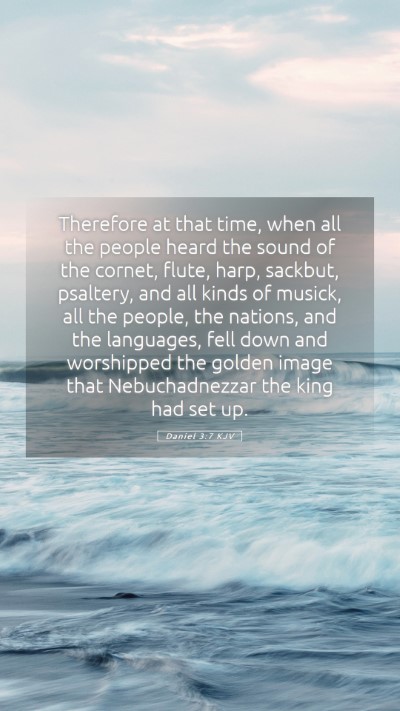Understanding Daniel 3:7
Daniel 3:7 states, "Therefore at that time, when all the people heard the sound of the horn, flute, harp, lyre, and all kinds of music, all the peoples, nations, and men of every language fell down and worshiped the golden statue that King Nebuchadnezzar had set up." This verse holds significant meaning in the context of worship, authority, and the challenges faced by believers. Below is a comprehensive analysis of its meaning based on interpretations from renowned public domain commentaries.
Bible Verse Commentary
The verse reflects a moment of collective action and societal pressure. The following insights delve into the verse's deeper meanings:
-
Matthew Henry:
Henry emphasizes the immediacy with which the people respond to the royal decree. The orchestration of music points to a deliberate attempt to facilitate worship of the golden idol. This symbolizes the power of external influences that can lead individuals away from true worship and towards idolatry.
-
Albert Barnes:
Barnes highlights the diversity of the crowd – people from various nations and languages. This detail underscores the universality of the king's influence. However, it is also a precursor to the standing contrast presented by Daniel and his friends, who would resist this enforced worship.
-
Adam Clarke:
Clarke remarks on the profound symbolism of music in this context, interpreting it as a means to control the hearts and minds of the people. His analysis suggests that the sound produced by the instruments was not merely celebratory but coercive, leading people to forsake their beliefs.
In-Depth Analysis
To fully grasp the meaning of Daniel 3:7, one must consider both the historical and theological implications:
Historical Context
During the time of Daniel, the children of Israel were in Babylonian exile. The decree to worship an idol served as a test of faith for those who recognized the one true God. The oppressive atmosphere in Babylon created a backdrop where allegiance to the king was enforced through ceremony.
Biblical Exegesis
Exegesis of this passage reveals the tension between earthly authority and divine command. The command to worship a statue contrasted sharply with the Jewish belief in monotheism—setting the stage for the faithful resistance demonstrated by Shadrach, Meshach, and Abednego in the subsequent verses.
Application to Daily Life
Believers today may find parallels to societal pressures that challenge their faith. This verse serves as a reminder to stay grounded in one’s beliefs despite external influences urging conformity.
Lessons from Daniel 3:7
- Stand Firm: The verse illustrates the need to stand firm in your faith amidst external pressures.
- Awareness of Influence: It emphasizes being aware of the influences that encourage idolatry and distraction from true worship.
- Group Dynamics: The collective worship illustrates how groups can compel individuals to act against their convictions.
Related Bible Cross References
- Exodus 20:3-5 - The commandment against idolatry.
- Revelation 13:15 - The pressure to worship the beast.
- Acts 5:29 - The call to obey God rather than men.
Conclusion
Daniel 3:7 serves as a pivotal moment in Scripture that explores themes of worship, authority, and the courage required to uphold faith in the face of societal pressure. Through careful reflection on this verse, one can glean significant Bible study insights, enhancing both personal faith and communal understanding.


